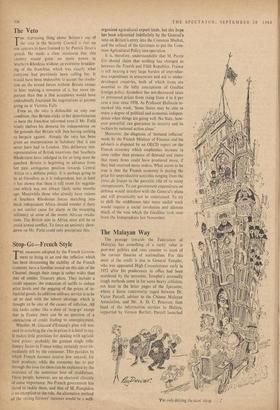The Veto
^rHE depressing thing about Britain's use of I the veto in the Security Council is that no one appears to have listened to Sir Patrick Dean's speech. He made a clear statement that this country would grant no more power to Southern Rhodesia without an extensive broaden- ing of the franchise, which was exactly what everyone had previously been calling for. It would have been impossible to accept the resolu- tion on the armed forces without Britain sooner or later making a nonsense of it, but more im- portant than that is that acceptance would have undoubtedly fractured the negotiations at present going on at Victoria Falls.
Even So, the veto is defensible on only one condition, that Britain sticks to her determination to have the franchise reformed even if Mr. Field Wisely shelves his demand for independence on the grounds that Britain will :hen having nothing to bargain against. Already the veto has been given an interpretation in Salisbury that it can never have had in London. This deliberate mis- representation of British intentions that Southern Rhodesians have indulged in for so long must be quashed. Britain is beginning to advance from her past ambiguous position towards Central Africa to a definite policy. It is perhaps going to be as friendless as it is independent, but at least it has shown that there is still room for negotia- tion which was not always likely some months ago. Meanwhile those who already have visions of Southern Rhodesian forces marching into black independent Africa should wonder if there i3 not similar cause for alarm in the mounting militancy of some of the recent African resolu- tions. The British aim in Africa must still be to avoid armed conflict. To force an untimely show- down on Mr. Field could only precipitate this.






































 Previous page
Previous page